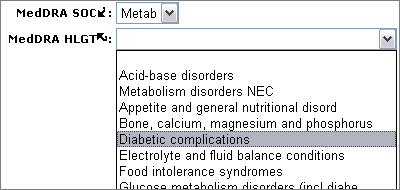Add linked fields
In cases where user interaction with a pair of fields, which are related and requires a selection of one field before presenting the values that are valid for another, you can include a linked pair of drop-down lists in your topic workflow configuration.
In the following example, the user interface presents linked fields for selecting a MedDRA SOC and MedDRA HLGT:

Users must select a value for the parent field, MedDRA SOC, first. The list of values for the subsidiary field, MedDRA HLGT, is then populated with values that are valid given that initial selection.

- You must define valid values for both of the fields in a linked pair. Both fields appear as drop-down lists in the user interface.
- Both of the fields in a linked pair must be custom fields that you add to the topic workflow configuration.
- You must define two different fields as the linked pair. A field cannot be selected as its own Link to parent field.
- Add the parent field
-
The first field you add is the parent field.
- In the left navigation pane, click the
Settings icon (
 ).
).
- In the Configure System section, click Manage Topic Workflow Configurations.
- Click the Row Action menu (
 ) for a configuration, and then click Manage
Fields.
) for a configuration, and then click Manage
Fields.
- Click Add Field.
- In the Column Name field, enter a column name.
- In the Display name field, type a name to display in the user interface.
- From the Format drop-down list, select either string or integer as the format.
- For a string field, in the Length field, specify a maximum field length.
- In the Type section, do not check any options.
- In the Context section, select the field context. The field can be used to collect information for a topic, action, attachment, or work team.
- To use the field as a filter, check Display as filter field. See Identify a field as a filter field.
- Click Save, and then click Back.
- On the Manage Fields page, click the Row Action
menu (
 ) for the parent field, and then click Define
Values.
) for the parent field, and then click Define
Values.
- Click Add Value.
- In the Value field, enter a value for users to select, and then click Save.
- Repeat steps 14 - 15 to add all possible values for the field. Alternatively, you can store all field values in a .csv (comma-separated value) file, and then upload it. See Upload a table of valid values.
- Modify the display order of the valid values as needed. For more information, see Modify the display order for the values.
- In the left navigation pane, click the
Settings icon (
- Add the subsidiary field
-
On the Add field page, enter a second, subsidiary, field.
- In the Column Name field, enter a column name.
- In the Display name field, type a name to display in the user interface.
- From the Format drop-down list, select either string or integer as the format.
- For a string field, in the Length field, specify a maximum field length.
- In the Type section, check Linked and, from the Link to parent field drop-down list, select the field you added as the parent field.
- In the Context section, select the same field context(s) as for the parent field.
- Optionally, specify the field to be used for filtering by checking Display as filter field. See Identify a field as a filter field.
- Click Save.
- Define the parent-child values
-
- On the Manage Fields page, click the Row
Action menu (
 ) for the subsidiary field, and then click Define
Values.
) for the subsidiary field, and then click Define
Values.
- Click Add Value.
- On the Add Value page, supply the values for users to select. For each value that you add, from the Link to parent value drop-down list, identify the value for the parent field that must be selected for this value to be available.
- Click Save.
- Repeat step 4 to add all possible values for the field. Alternatively, you can store all field values in a .csv (comma-separated value) file, and then upload it. See Upload a table of valid values.
- Modify the display order of the valid
values, as needed. For more information, see Modify the display order for the values.
By default, both new fields will be editable for a topic or action in any workflow state, or for any type of document-style attachment. Users can select a value or select " " (blank).
- Alternatively, you can make one or both of these fields required (the blank value is not offered, and users must select one of the defined values before saving). Generally, you should apply the same access level to both of the fields in the linked pair. See Manage topic field accessibility by state, Manage action field accessibility by state, or Manage attachment field accessibility by type.
- On the Manage Fields page, click the Row
Action menu (
Parent topic: Manage fields